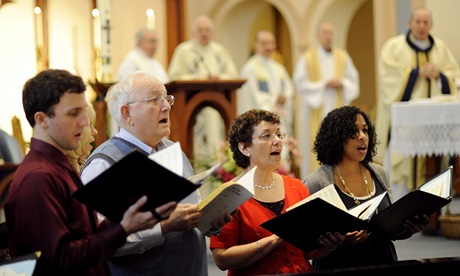Using Catholic hymns containing doctrinal inaccuracies, or those written by composers with credible accusations of abuse against them, is no longer allowed in one US diocese.
“Lord of the Dance” is off the list the diocese says. So is “Let us Break Bread together on our Knees”.
Guidelines
Last week a decree from the Diocese of Jefferson City, Missouri formally aligned its music practices with the US Bishops Conference’s 2020 guidelines.
The diocese’s goal is to encourage “full, conscious and active participation in the liturgy” through a common musical repertoire, says Jefferson’s Bishop W. Shawn McKnight
The decree lists several hymns that should be “absolutely forbidden” says McKnight. Many fail to present the Church’s teaching on the Eucharist accurately.
Most were written in the 1980s or 1990s; the oldest dates back to the 1960s.
Father Daniel Merz, who chairs the diocesan liturgical commission, says some hymns over-emphasise elements of the Eucharist, such as its communal and social dimensions, while neglecting other crucial elements such as the sacrifice, the Real Presence and the need for personal conversion.
In addition, any music composed by David Haas, Cesaréo Gabarain and Ed Conlin is banned: all three have credible accusations of abuse against them.
Approved hymns
Merz says besides listing banned hymns and composers, the decree lays out four Mass settings approved for use in the diocese – though parishes are not obliged to use them.
A list of approximately 130 approved hymns is being compiled for parishes to incorporate into Masses, thus ensuring they have a diverse, theologically sound collection for common use.
Concerns raised
The US Bishops’ 2020 guidelines – “Catholic Hymnody at the Service of the Church” – lays out criteria for evaluating hymns.
Emphasising music’s formative power and its influence on Catholics’ understanding and practice of the faith, they warn that hymns with inaccurate or incomplete theology can distort understanding of key doctrines.
Some lyrics used in the liturgy “may be misleading or lacking in substance” the guidelines say. They have no place in a Catholic Mass.
Examples include hymns implying the Eucharist is merely bread and wine rather than the true body and blood of Jesus.
Another key target was hymns that convey an inaccurate view of the Jewish people, particularly hymns that “imply that the Jews as a people are collectively responsible for the death of Christ”. “The Lord of the Dance” is particularly problematic in this category.
Music serves Scripture
Liturgical music expert Adam Bartlett sees McKnight’s decree as an “invitation to rediscover what music in the Mass is truly meant to be” for parishes in the diocese.
The distinction between Catholic devotional and liturgical music is important he says. Devotional music can cater to individual preferences and contemporary styles. Liturgical music should aim higher.
“I think there’s a great opportunity for a real renewal in liturgical music … young people are drawn to beauty” he commented.
“Those who are actually converting and deeply engaged in their faith, I think are here because we want the real thing.”
Source
Additional readingNews category: World.




